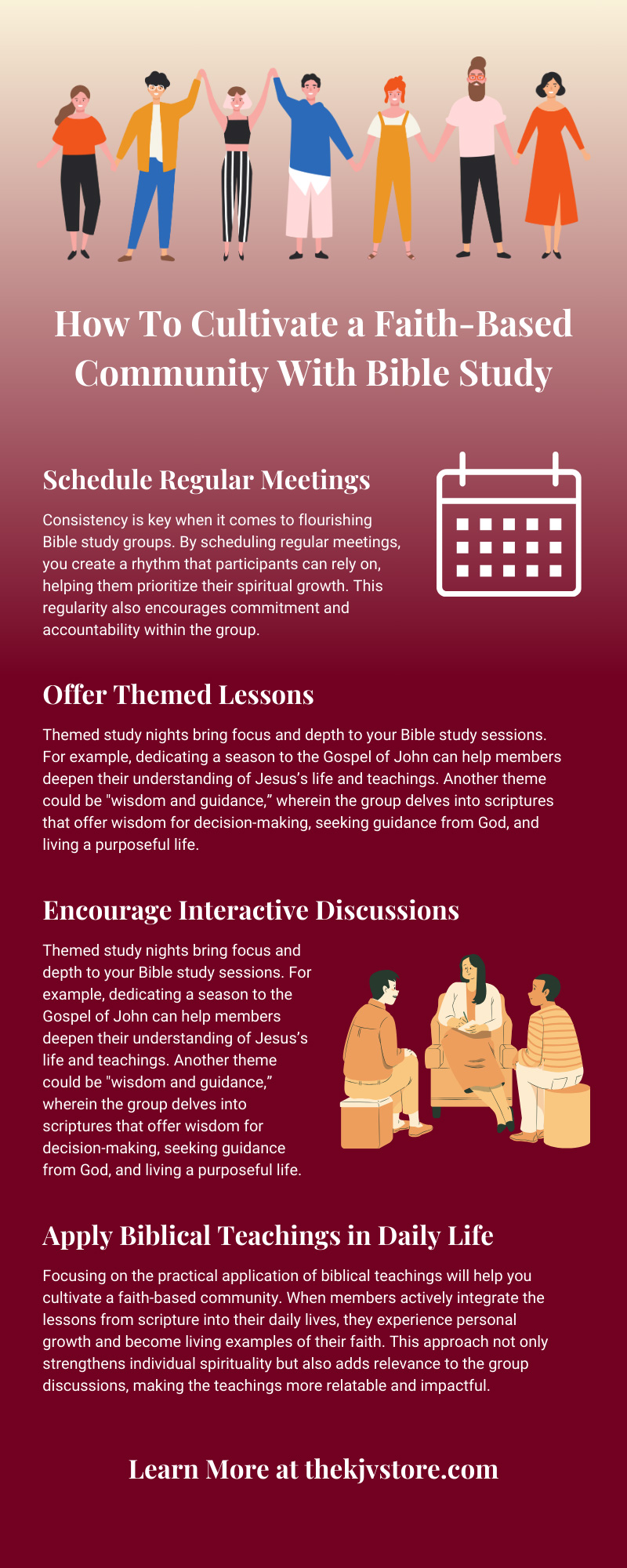How To Cultivate a Faith-Based Community With Bible Study

A faith-based community is a group of believers who come together to worship, study the Bible, pray, and support each other in their spiritual journeys. This community provides a sense of belonging, accountability, and encouragement that nurtures individual spiritual growth and deepens one’s relationship with God. Learn how to cultivate a faith-based community with Bible study.
Schedule Regular Meetings
Consistency is key when it comes to flourishing Bible study groups. By scheduling regular meetings, you create a rhythm that participants can rely on, helping them prioritize their spiritual growth. This regularity also encourages commitment and accountability within the group.
Regular meetings allow members to build relationships over time. Frequent interactions help forge deeper connections, making the community feel more like a spiritual family. Additionally, it keeps the momentum going, ensuring that participants stay engaged and motivated.
Offer Themed Lessons
Themed study nights bring focus and depth to your Bible study sessions. For example, dedicating a season to the Gospel of John can help members deepen their understanding of Jesus’s life and teachings. Another theme could be "wisdom and guidance,” wherein the group delves into scriptures that offer wisdom for decision-making, seeking guidance from God, and living a purposeful life.
Themes make Bible study more engaging and purposeful. They provide a clear direction and set expectations, which can be particularly helpful for newcomers. Plus, themed nights can create anticipation and excitement, encouraging more consistent attendance.
Tip: Use a Study Bible
The KJV Scofield Study Bible offers valuable insights and annotations that can assist in crafting themed Bible study lessons. Its comprehensive footnotes and cross-references provide in-depth explanations that can enhance understanding of specific themes. Additionally, its detailed book introductions and reference indexes serve as excellent resources for selecting and preparing focused study sessions.
Encourage Interactive Discussions
Interactive discussions are vital for a meaningful Bible study experience. Encourage participants to ask questions and share their interpretations to deepen their understanding. Open dialogue allows for diverse perspectives, enriching the study experience for everyone involved.
Active participation fosters a sense of belonging and engagement. When members feel heard and valued, they are more likely to continue participating. Additionally, interactive discussions can lead to new insights and revelations, making the Bible come alive in new ways.
You can use these strategies to encourage participation in group discussions:
- Create a safe environment: Ensure that the group feels comfortable and supported so that everyone feels confident to share their ideas.
- Ask open-ended questions: Open-ended questions stimulate discussion and allow participants to express their thoughts more freely.
- Assign discussion leaders: Rotating discussion leaders can help to engage different members and bring various perspectives to the conversation.
- Use relevant examples: Relating biblical texts to current events or personal experiences can make discussions more relatable and engaging for members.
- Encourage active listening: Promote an environment where each participant listens carefully and responds thoughtfully to what others share.
- Make smaller groups: Smaller groups enable more intimate and personalized discussions, making it easier for individuals to share personal experiences and insights.
Remember that not everyone needs to speak aloud if they’re uncomfortable. Encourage shy individuals to participate in ways that suit them, such as writing down thoughts. Create a welcoming and non-judgmental environment that allows everyone, including shy members, to engage at their own pace.
Apply Biblical Teachings in Daily Life
Focusing on the practical application of biblical teachings will help you cultivate a faith-based community. When members actively integrate the lessons from scripture into their daily lives, they experience personal growth and become living examples of their faith. This approach not only strengthens individual spirituality but also adds relevance to the group discussions, making the teachings more relatable and impactful.
Encourage participants to share how they’ve applied specific biblical principles in their own lives. These personal testimonies can inspire others and provide practical insights into how to live out their faith. By emphasizing real-world application, the Bible study group becomes a vital source of encouragement and practical wisdom for all members.
Invite Guest Speakers
Inviting guest speakers or leaders to Bible study sessions can offer fresh insights and perspectives. These speakers can bring new interpretations and applications of scripture that may not have been considered before. Their expertise and experience can enrich the group’s understanding and foster deeper discussions.
Guest speakers also help break the routine and keep the sessions engaging. They can address specific topics or questions the group is interested in, providing targeted knowledge and inspiration. Reach out to local pastors, community leaders, or scholars, and offer them the opportunity to share their insights and perspectives.
Share Personal Stories of Faith
Personal testimonies are powerful tools for building community. Encourage members to share their faith journeys during Bible study sessions. These stories can inspire and uplift others, building empathy and understanding within the group.
Sharing personal stories helps to humanize the faith experience. It shows that everyone has their struggles and triumphs, making the community feel more supportive and inclusive. Additionally, these testimonies can serve as powerful reminders of God’s work in our lives, strengthening collective faith.
Pray Often
Praying in your Bible study sessions helps members to connect with God and each other on a deeper level. Begin and end each session with prayer, focusing on both personal intentions and collective needs. As Philippians 4:6 states: “Be careful for nothing; but in every thing by prayer and supplication with thanksgiving let your requests be made known unto God.”
Through prayer, Christians communicate their faith, hopes, and concerns, inviting God’s presence and intervention in their lives. Encourage members to share their prayer requests and pray for one another regularly. By making prayer a central component of your Bible study, you cultivate a sense of unity as you seek God’s will together.
Serve Together
Community service and outreach activities are excellent ways for Bible study groups to live out the values taught in scripture. Organizing group service projects allows members to demonstrate compassion and love in practical ways. These activities might range from volunteering at local shelters to participating in global missions.
Serving together fosters a sense of purpose and camaraderie, reinforcing the teachings you discuss during Bible studies. It also provides opportunities for members to see the real-world impact of their faith, which can nurture their commitment to both the group and the broader community.
To build a thriving faith-based community, incorporate regular Bible study meetings, themed lessons, interactive discussions, and practical applications of scripture. Additionally, inviting guest speakers, sharing personal testimonies, and prioritizing prayer and community service strengthen group unity. Together, these elements promote spiritual growth and foster a compassionate, understanding environment. Such a community becomes a powerful space for mutual support, growth, and living out faith in everyday life.

